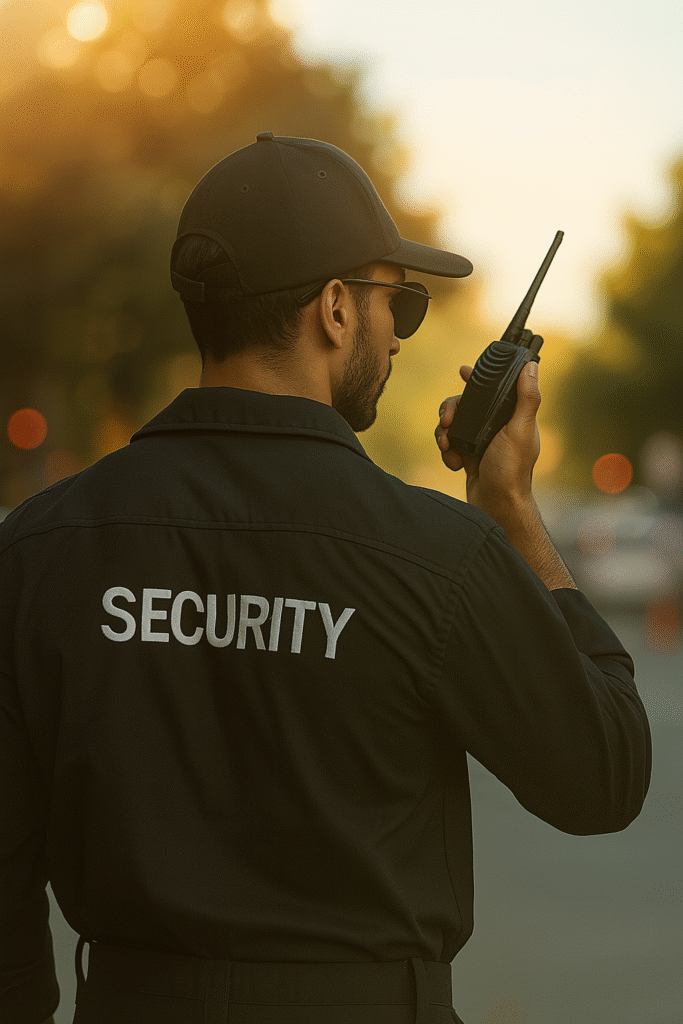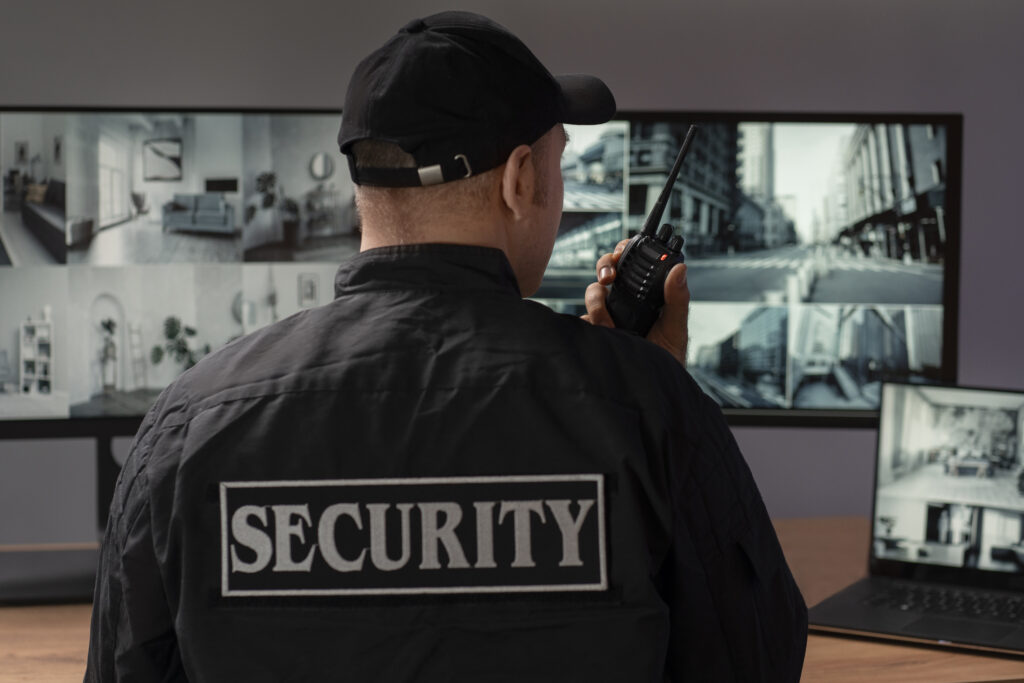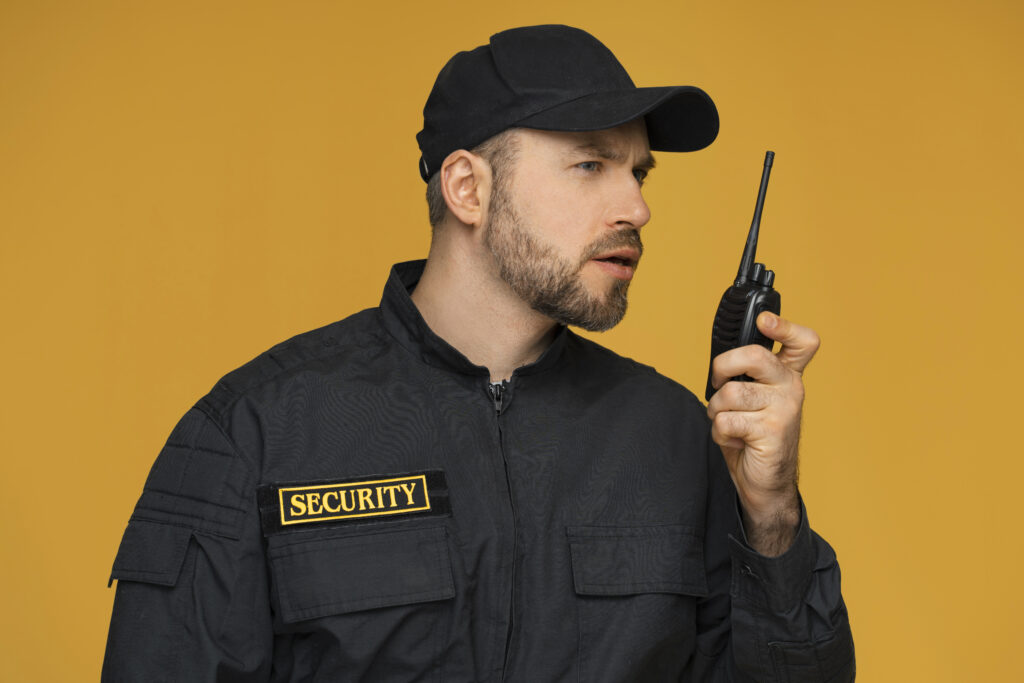Night Shift Safety Tips for Security Guards are not just useful—they are essential. Security personnel working overnight are exposed to a unique set of risks: reduced visibility, fatigue, isolation, and the increased likelihood of criminal activity.
Whether patrolling a quiet industrial complex or monitoring a hospital parking lot, night guards must remain vigilant, prepared, and protected.

This article explores actionable safety tips, personal protection guidelines, and mental preparedness strategies to enhance night shift security guard safety.
Why Night Shifts Are More Dangerous for Security Guards
Night shifts increase risk due to:
- Low visibility, making it easier for threats to hide
- Fatigue, which dulls reaction time and decision-making
- Limited supervision or backup, especially in remote locations
- Higher likelihood of property crimes, including theft, vandalism, or trespassing
The combination of these factors makes safety planning an absolute priority.
Night Shift Safety Tips for Security Guards
1. Maintain Situational Awareness
Always know your surroundings. Continuously scan your environment—whether inside a building or out on a patrol route. Use surveillance tools, mirrors, and routine check-ins to stay alert.
Carry a reliable flashlight, even if areas are well-lit, and scan blind spots carefully.

2. Establish a Check-in System
Use a buddy system, mobile app, or scheduled radio calls to check in with supervisors or other guards at fixed intervals. If something goes wrong, help can be dispatched quickly.
Apps like GuardTour, Silvertrac, or TrackTik offer automated GPS-enabled patrol and check-in features.
3. Wear the Right PPE and Gear
- High-visibility vest for outdoor or parking patrols
- Steel-toe boots and durable uniforms for foot patrols
- Body-worn camera if allowed by employer
- Two-way radios or smartphones with emergency contact programmed
- Flashlight or headlamp with long battery life
👉 Explore gear options at SafetyProductSupply.com (DoFollow)
4. Learn Self-Defense and De-escalation Techniques
Security guards should receive training in:
- Verbal de-escalation
- Self-defense tactics (non-lethal force)
- Safe distancing and evasive positioning
- Recognizing suspicious behavior before it escalates
Partner with local police for workshops or request employer-sponsored training.
5. Stay Physically and Mentally Fit
Fatigue and poor health can compromise safety:
- Avoid heavy meals before duty
- Stay hydrated and snack on energy-boosting foods
- Use standing desks or walk intermittently if stationed indoors
- Get 7–8 hours of sleep post-shift to restore alertness
Exercise outside of work hours to stay agile and resilient.
6. Use Well-Maintained Equipment
Before starting the shift, inspect:
- Flashlights and batteries
- Radios and chargers
- Door keys or access cards
- First-aid kits
- Alarm panels and CCTV systems
Never begin patrols without confirming equipment is operational.
7. Follow Lighting and Patrol Best Practices
- Use the most illuminated routes during patrols.
- Avoid creating predictable patrol patterns.
- Pause before turning corners or opening doors—never rush.
- Use mirrors or CCTV feeds to check blind spots before entering rooms.
Changing your route regularly prevents potential intruders from anticipating your movements.
8. Document Everything
If an incident occurs—no matter how minor—log it immediately. This:
- Helps supervisors track trends
- Provides legal protection
- Ensures accountability
Use mobile patrol software or physical logbooks to record events in real-time.

Security Guard Night Shift: Risk Scenarios & Safety Solutions
| Risk Scenario | Safety Tip |
|---|---|
| Suspected intruder in dark area | Stay back, radio for backup, observe from a safe spot |
| Power outage | Use flashlight, secure entrances, notify facility team |
| Medical emergency on patrol | Call 911, apply basic first aid if trained |
| Verbal altercation with trespasser | Use calm tone, keep safe distance, call authorities |
Mental Health Considerations for Night Guards
Night work can be isolating and mentally draining. To maintain psychological well-being:
- Take scheduled breaks
- Use blue-light blocking glasses during rest periods
- Socialize with fellow guards before/after shifts
- Talk to supervisors about stress management resources
Mental fatigue is just as hazardous as physical fatigue during night shifts.
Final Thoughts on Night Shift Safety Tips for Security Guards
Night Shift Safety Tips for Security Guards offer more than protection—they promote confidence, job satisfaction, and professionalism.
By following proven safety protocols, using proper gear, maintaining good health, and staying mentally prepared, night security personnel can prevent harm while performing one of the most important jobs in workplace safety.
Whether you’re guarding a construction site or patrolling a hospital wing, remember: your awareness and preparation are your best defense.


No comments yet